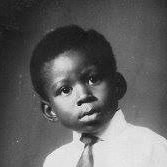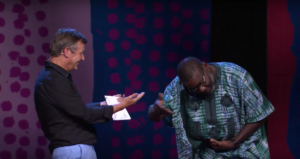On my recent visit to Lagos I received at the hotel a brown envelope from my old friend Tunji Lardner, whose bulky frame has somehow found a way of elbowing itself into this column on previous occasions. I had learnt that he had returned to his old metier from the world of civil society consultancies to that of being a columnist for The Guardian in Lagos. I had sought to see samples of his current work (in part as I am a lazy downloader), as an admirer of his sardonically rumbustious (or do I mean rumbustiously sardonic?) turn of phrase, from the days when he worked in the turbulent magazine journalism of the 1980s and, later, was the New York correspondent of West Africa, This still permits him to refer to me as his ‘former editor’, and our paths have intermittently crossed from Camberwell down south to Mmabatho via New York’s Upper West Side. This allows me to engage in something from which I normally abstain – commenting on the work of another writer, knowing I risk retaliation.
In the envelope there were not only some of his own recent columns, but he had included the farewell reflections of one of Nigeria’s iconic veteran columnists, Sonola Olumhense, thirty years after his first piece in The Guardian, actually in the maiden issue. It is a very moving piece, if occasionally mournful, as it recalls the seminal role of the late Stanley Macebuh and three other co-travellers on the editorial board, Chinweizu, Femi Osofisan and Onwuchekwa Jemie, all names still to conjure within the story of Nigeria. Chinweizu at one time was a regular contributor to West Africa in the Cold harbour Lane days and now holds forth in Business Day; I came upon Femi Osofisan as a judge of the Noma Prize for Publishing in Africa (now, alas, no longer functioning). And I actually saw Prof. Jemie in person on my recent Lagos visit when I went out to the spanking new Apapa offices of Business Day, where he is Editor-in-Chief.
I say “mournful” not because of the nostalgia element in the piece, but because of the gloomy eye cast over the Nigerian condition in the past thirty years, notably when writing of how, thirty years on, and “hundreds of billions of Nigeria’s oil dollars later, just a few Nigerians have unimaginable wealth that is only paralleled by the astonishing poverty of most of our people.” This angrily radical perspective is probably why Tunji sent it to me, as it reflects the eloquently severe tone of his own columns that began appearing in the same newspaper last year, and that seem a wider reflection of the current national mood. He has lost none of his particular power with words (among his favourites are “dysfunctional”, “delusional” and “ecosystems”) and particular Lardneresque formulations such as the “Nigerian Distortion Reality Field” the “reality-illusion clash” which he acknowledges as his own personal creation – a notion triggered by watching on TV the independence day celebrations in Eagle Square Abuja which he saw as a metaphor for the NDRF. His Cartesian slogan “We shout, therefore we are” reminds me of the Freedom Park incident described in this column two weeks ago (”We are Nigerians. We argue”).
What is important is that this excitement at language is channelled and directed towards reader-galvanisation on very serious subjects, occasionally inspiring him to the heights of oratory deserving serious study by students of invective. He is unafraid of the extra long sentence, even if on occasion his rhetoric illustrates the very phenomena he denounces. As a grammarian myself (and one who occasionally has dared to deconstruct the prose of verbally-prolific writers like Soyinka), I am well aware that a long sentence, especially if containing a controlled number of subordinate clauses, can be a work of art. For example, on the so-called Nigerian factor we find in sixty-nine words; “on the one hand, with increasing difficulty we try to manoeuvre around the colossal elephant in our national living room, scrunching, slipping and sliding around the massive best we must surely one day confront and the other is the boastful national posturing and braggadocio as personified by that frightening archetype the Nigerian ‘Big man’ or the Ogas at the top and bottom of a dysfunctional and crumbling state.” He can also achieve stylistic balance with a short punch-line sentence. Responding to the cliché ‘Only God can save Nigeria” he remarks tersely “Leave God out of this wilful self-created mess”
This questing to define the collective Nigerian psyche, with such panache and humour reminds me of nothing so much as Peter Enahoro’s locus classicus How to Be a Nigerian written in the heady years immediately after independence, celebrated in Kakadu the musical (see this column passim in the past few weeks) as a “time of infinite possibilities”. Enahoro’s book was a text for its time, but still has a freshness that deserves re-examination in this ‘centenary’ year of national stocktaking.



